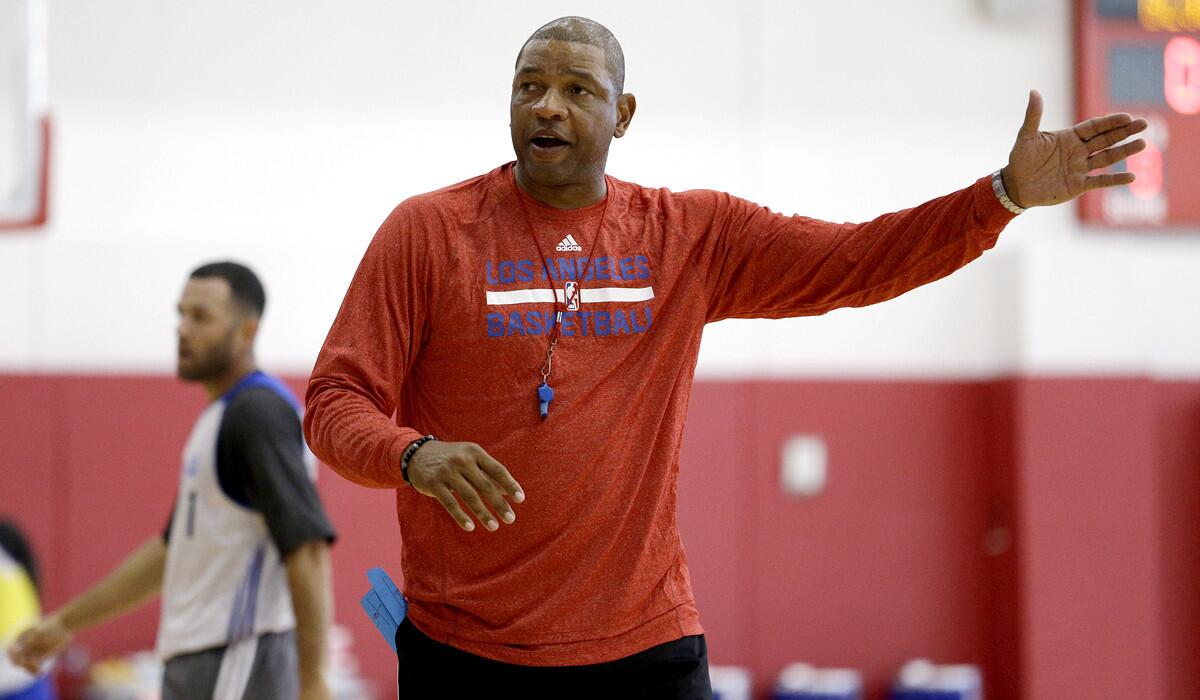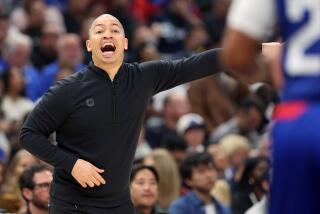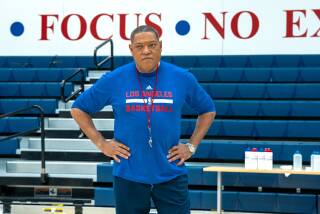Doc Rivers dispels Clippers’ pain with his healing powers

- Share via
It remains fascinating that the person with the medical nickname did the most healing for the Clippers last season.
When Donald (Step On My Tongue) Sterling spewed his stupidity, Glenn (Doc) Rivers was there with ointment and bandages. He protected, guided and navigated this oft-abused and suddenly under siege franchise through the rapids and waterfalls of public relations disaster.
In this case, Rivers’ nickname could have just as easily been derived from having a doctorate in common sense.
A new season is about to begin.
The Clippers played their first exhibition game Tuesday night and will start the regular season in three weeks, Oct. 30 at Staples, against Kevin Durant and the Oklahoma City Thunder. Yes, that Oklahoma City Thunder, which sent Rivers’ team home early in the playoffs last season.
The all-encompassing horror over Sterling’s racial comments is gone but the uproar is not forgotten. The team has a new owner, Steve Ballmer. It also has the returning face of the franchise that carried it out of the crisis and into the sunshine last season. He is Doc Rivers, the surgeon of solace.
The Clippers held a public workout and scrimmage Wednesday at USC’s Galen Center and several hundred showed up. It was relaxed, fun. Drills were explained, demonstrated.
Three weeks is a long time to keep players interested and on edge before they play a real game. But Rivers is not interested in just sliding into a season, as they apparently tried to in a 112-94 loss to the Golden State Warriors in their exhibition opener Tuesday night.
“We have to show up, every game, every time,” Rivers said. “We can’t just live on ‘We’re the Clippers.’ ”
At the beginning of the public workout, Rivers took the microphone and went right to the heart of the matter with the gathered crowd.
“Thanks for supporting us last year,” he said. “That’s gone.” And he pointed skyward, as if to show the bad karma the way out.
It wasn’t clear whether he were saying Sterling was gone or the bad feeling about the loss in the conference semifinals was gone. It didn’t matter.
This season is clearly a new day and new awakening for a team, a franchise and its fans. Had it not been for Rivers, that new day could have still been overcast and rainy.
Asked about his role in the exorcism of Sterling from the Clippers’ collective psyche, Rivers admitted he had not been prepared for what he faced.
“I wished I had had a class to go to,” he said.
He indicated he tends to credit his success in this to the people around him along the way, people such as his parents — his father is a police officer — plus teachers and coaches as he grew up in suburban Chicago, played in high school at Proviso East and in college at Marquette.
In Maywood, Ill., there was racism. At Marquette in Milwaukee, there was racism. He married a white woman at Marquette and it caused enough trouble to nudge him to go pro after his junior year. He did, of course, go back and get his degree in pre-law and political science — perfect in many ways for repairing Sterling scorched earth.
At Marquette, he grew up as a basketball player and person under the tutelage of the unholy trio, a characterization made here with affection. There was head coach Al McGuire, the crazy genius; main assistant Hank Raymonds, the tactical genius, and second assistant Rick Majerus, the troubled genius. Their real genius was that their collective life lessons had equal traction to their basketball ones.
Rivers also had a high school coach at Proviso East, Glenn Whittenberg, whom he calls “a real Marine.”
The message from Whittenberg, often referred to by Rivers as an early wake-up lesson, was on a sign on the gym wall: “If you think you are so important to this team, stick your foot in a bucket of water. When you take your foot out, the hole you leave will be how much you are missed when you walk out the door.”
Rivers admitted Wednesday he hadn’t, at first, totally comprehended the reach and toxicity of the impending disaster Sterling had created. The word “distraction” didn’t come near to capturing it.
“I didn’t know this would take on a life of its own,” he said.
He said he had made mistakes, but had done one major thing correctly.
“We spoke with one voice,” he said. “I just didn’t want one of the players to say something that he thought was clever and then he would become the story.”
At center court, Rivers watched his assistants run the drills. Each is hand picked for basketball expertise and personality type.
“I don’t want any yes-men,” Rivers said. “I want them in my face, and then we’ll sit down and have at it.”
In watching Rivers, there was a wave of revelation.
In a city of closely scrutinized pro teams, the safest, most secure and best positioned to lead Los Angeles to future success are two people not even on L.A.’s radar four years ago — Darryl Sutter of the Kings and his two Stanley Cup Final victories, and Rivers.
Mike Scioscia and Don Mattingly have just come off disappointing endings with the Angels and Dodgers. Byron Scott is shiny new with the Lakers and Bruce Boudreau not only didn’t have a great season with the Ducks, but had one of the more popular players in the history of the NFL, the retired Teemu Selanne, fire a recent blast of criticism across his bow.
There is no denying it. Los Angeles is fortunate to have a doctor in the house.
More to Read
Go beyond the scoreboard
Get the latest on L.A.'s teams in the daily Sports Report newsletter.
You may occasionally receive promotional content from the Los Angeles Times.







